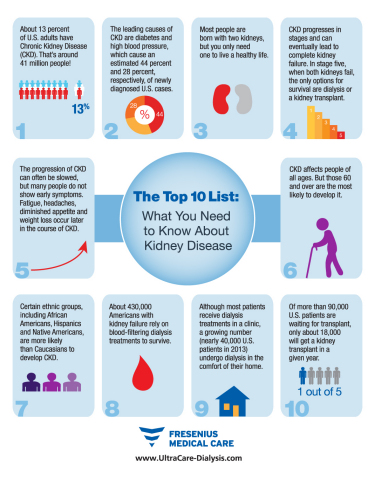WALTHAM, Mass.--(BUSINESS WIRE)--More than 26 million Americans have chronic kidney disease (CKD), but many don’t realize it because people often do not have symptoms early in the disease. This March, during National Kidney Month, Fresenius Medical Care North America (FMCNA), the nation’s leading network of dialysis facilities, is urging Americans to learn more about CKD. Those who are at risk should get screened regularly, since early intervention may slow the progression of the disease.
Kidneys are remarkable organs that keep the body healthy in many ways, including cleaning waste products from the blood and releasing important hormones into the blood. Healthy kidneys filter about 200 liters of blood a day, as well as help regulate blood pressure and direct the production of red blood cells. But they can be damaged by diabetes, uncontrolled high blood pressure and even the use of some over-the-counter medications and supplements.
CKD – a loss of kidney function that can take place over a period of months or years – often goes undiagnosed in its early stages when it may still be treated by medication, exercise and diet changes. Once the disease progresses to kidney failure, the only options for survival are dialysis treatments or a kidney transplant.
“It’s important to find out early if you have CKD, because there are often interventions that may slow its progression,” says Dr. Dugan W. Maddux, vice president of Kidney Disease Initiatives at FMCNA. “Especially if you have diabetes or high blood pressure, you need to understand your risks and get regular screenings.”
The Top 10 List: What You Need to Know About Kidney Disease
1. About 13 percent of U.S. adults have CKD.
2. The leading causes of CKD are diabetes and high blood pressure, which cause an estimated 44 percent and 28 percent, respectively, of new U.S. kidney failure cases. Diabetes rates are rising in large part due to increasing obesity rates.
3. Most people are born with two kidneys, but you only need one functioning kidney to live a full, healthy life.
4. CKD progresses in stages and, if untreated, can lead to complete loss of kidney function. At CKD stage five, when both kidneys fail completely, the only options for survival are dialysis or a kidney transplant.
5. The progression of CKD can often be slowed, but many people do not have symptoms early in the disease. Symptoms such as fatigue, headaches, diminished appetite and weight loss occur late in the course of CKD.
6. CKD affects people of all ages. However, those 60 and over are the most likely to develop CKD.
7. Certain ethnic groups, including African Americans, Hispanics and Native Americans, are more likely than Caucasians to develop CKD.
8. About 430,000 Americans with kidney failure rely on regular blood-filtering dialysis treatments to survive.
9. Although most patients receive dialysis treatments in a clinic three days a week, a growing number (nearly 40,000 U.S. patients in 2013) undergo dialysis in the comfort of their own homes.
10. More than 90,000 U.S. patients are waiting for kidney transplants, but only about 18,000 of those will get a kidney transplant each year.
For more information about kidney disease and its treatments, visit FMCNA’s website at www.ultracare-dialysis.com; if you or a loved one are at risk for CKD, please visit your physician and get screened. For more information on National Kidney Month, please visit www.ultracare-dialysis.com/kidneymonth.
About Fresenius Medical Care North America
Through our leading network of more than 2,150 dialysis facilities in North America and our vascular access centers, laboratory, pharmacy and affiliated hospitals and nephrology practices, Fresenius Medical Care provides renal services to hundreds of thousands of people throughout the United States, Mexico and Canada. We are also the continent’s top producer of dialysis equipment, dialyzers and related disposable products and a major supplier of renal pharmaceuticals.
For more information about the company, visit www.fmcna.com; for information about patient services, visit www.ultracare-dialysis.com.




